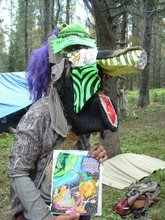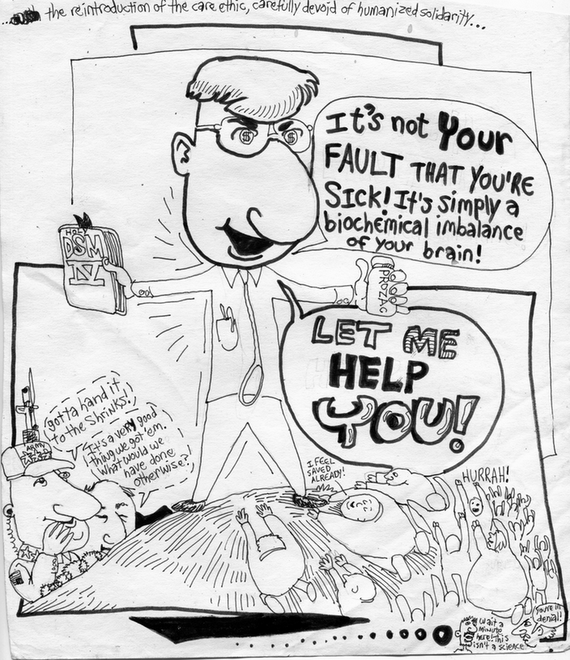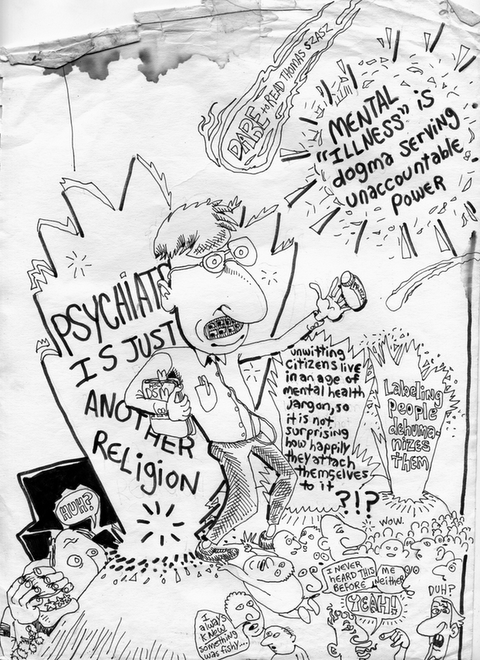Excerpts from The Politics of the Mind [quoting R.D. Laing's ideas]
... The struggle, then, is the struggle to control behaviour by defining experience. Society does this through its various agents by defining "reality" in terms of norms and then using those norms as ideal standards.
I would like to take a magnifying glass to "society". What is this term we so often take for granted in using? Really, it is a top-down, chain-of-command game, given cammo, and inserted in the imaginations of the inexperienced recruits (gOOd term!) new (and so unprepared) for "society".
The primary agent is the family.
I think we are agreeing here. I would just like to understand the idea of "agent"; i figure "agent" is yet another soldier ordered or mandated (or?) to carry out the value system of war mind-set (the shared values of such).
But primary agents? Hmm, yes, okay, at least as far as the young recruits are concerned. Yet the *nuclearized* family (not so much the traditional, extended, independent family largely (?) existing before the 19th century (?)) is a conditioned situation, after all. Parents excerpted away from those in (or leaning towards) solidarity with them as human beings, and put into the system of professionals "helping".
Would you agree?
It is, Laing says, "in the first place, the usual instrument for what is called socialization, that is, getting each new recruit to the human race to behave and experience in substantially the same way as those who have already got here". As social agents, the family reproduces in the child a set of attitudes that will outfit him for life in what Herbert Marcuse calls the "one-dimensional society".
One-dimensional, surely. We as "human resources" (said right out in the open) for the meta plan and forever war.
"The family's function is to create, in short, one-dimensional man; to promote respect, conformity, obedience; to con children out of play; to induce a fear of failure; to promote a respect for work; to promote a respect for respectability.
Ah! To CON kidz out of play! Whoa, yes,,,
... From the moment of birth, when the Stone Age baby confronts the twentieth-century mother, the baby is subjected to these forces of violence, called love, as its mother and father, as their parents and their parents before them, have been. These forces are mainly concerned with destroying most of its potentialities, and on the whole this enterprise is successful. By the time the new human being is fifteen or so, we are left with a being like ourselves, a half crazed creature more or less adjusted to a mad world. This is normality in our present age.
How ignorant i've been of Marcuse!
... Society highly values its normal man. It educates children to lose themselves and to become absurd, and thus to be normal. Normal men have killed perhaps 100,000,000 of their fellow normal men in the last fifty years."
Reminds me of Paul Goodman! re: absurd...
But some cannot adapt to this imposed normality. They break down. Instead, they devise a strategy to deal with their inability to hold their invalidated experience and their sense of themselves together. As Laing puts it, "it seem to us that without exception the experience and behaviour that gets labeled schizophrenic is a special strategy that a person invents in order to live in an unlivable situation".
i like to say that we in pain create a self-taught, or *folk way* of managing our situations. i must've read this before, but don't recall it. Was it in his _The Politics of Experience_?
The schizophrenic may look like someone whose "logic" is "ill", he is, in reality, someone, who has been made an invalid because his experience has been invalidated.
Our input is not allowed, it is prohibited in the chain-of-command paradigm. And this is not only true of the "schizophrenic" or those labled "mentally ill"; we see that most of us invalidate such inside our heads (re: the biggest cops are in our heads).
For Laing and Cooper, schizophrenia is not "something happening in a person but rather something between persons". Thus when one psychiatrist calls schizophrenia "a failure of human adaptation", Laing responds that it may as well be "a successful attempt not to adapt to pseudo-social realities".
The other shrink reflects the confines he herself knows she must conform to. Laing spoke of the idea of letting people *go into their symptoms* instead of suppressing them. The blindspot I think he had tho (and led to the intense chaos of his alleged primary challenge --Mary Barnes) was that as a shrink himself he had bought into a way of doing things which separated, way too much, actual living.
Whereas, the pre-colonized (kidz, aboriginals in connection with their traditions), play and dance and self-validate their creativity. Had Mary Barnes (and Laing) been allowed/allowed themselves to escape the psychiatric corrall and *art their lives* more freely, Barnes, for one, would have a good reason to stay in only one paradigm.
... the condition of alienation, of being asleep, of being unconscious, of being out of one's mind, is the condition of the normal man."
On the other hand, Eastern spiritual practices push for folks to escape their mind--their programmed personality, tho within "ego-less" states of what i think are repressive; but non-threatening to most states, and thus allowed to exist. Agree?
On the other hand schizophrenia may be seen as an alienation from this alienation, where, "even through his profound wretchedness and disintegration", the patient may be "the heirophant of the sacred".
[size=10][list]madness need not be all breakdown. It may also be break-through.
Or a processing, which i think Laing was in touch with, even tho from an academic/semi-alienated position. Didn't he see his scientific aid as helping 'patients'/'clients' to go through this process, and then *bringing them back*? After that, i'm not certain, as i was disinclined, when i read that, to hang with intellectualized discussion for very long. (i'm more "poetic"-ly inclined)
...we have a long, long way to go back to contact the reality we have all long lost contact with. And because they are humane, and concerned, and even love us, and are very frightened, they will try to cure us. They may succeed. But there is still hope that they will fail. - Peter Levine
I would rather that they play along with us and evolve their "good education" (and their career mind-set) to where they find liberation for themselves as well! No need to attack them (only their dogma and war behavior); just show how such war imagination as their own style of chain-of-command (a microcosm of the larger picture) confines them. Underneath the war game of psychiatry (and other social sciences allowed to be established), there *is* a human being with good intentions; it's just that the institutional imagination compells them to become something more along the lines of assasins of sanity.
Arguments, no doubt, can be made, to the perhaps folly of trusting those artificially enamored to such authoritarian structures, but my method/theory/practice seeks to keep doors open for human beings no matter what imprisoning machine has grown around them.
As for "a long way to go"? I strongly disagree. The long way belief seems to me an example of what aboriginals call modernized man's curious penchance for making things a lot more complicated than they really are! (surely, an illustrating symptom of most of modernized peoples' belief that social overhaul can only come about by increasing insanity quotients via such dark age ideas as armed struggle)
(note: i'm not saying that those who believe they must pick up the stupidity called such things should or must desist; each of us makes our own decisions. But i'll speak my "mind", anyway, while seeking to inspire radical's radical imagination beyond the pale of "What Must Be Done"!



No comments:
Post a Comment